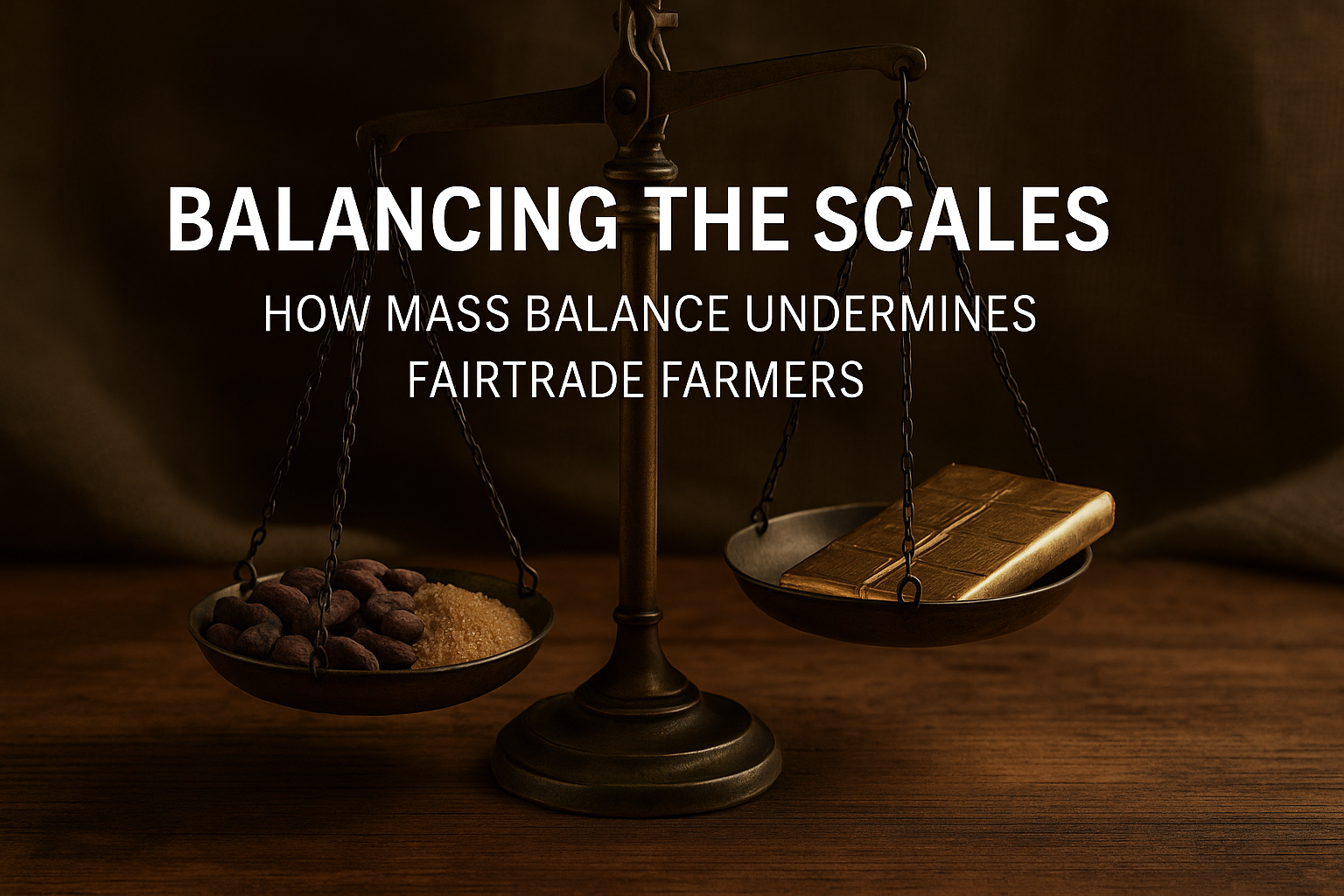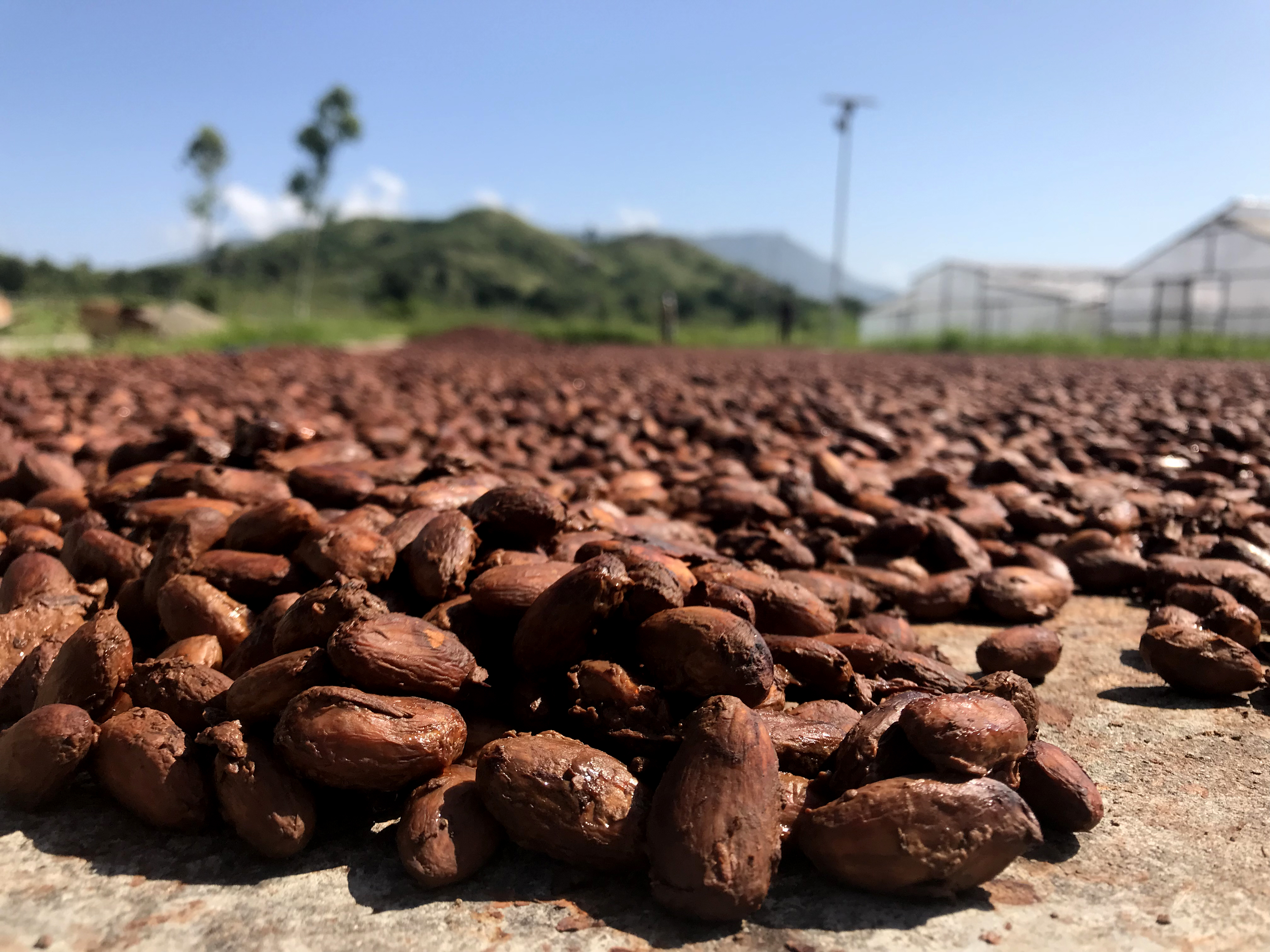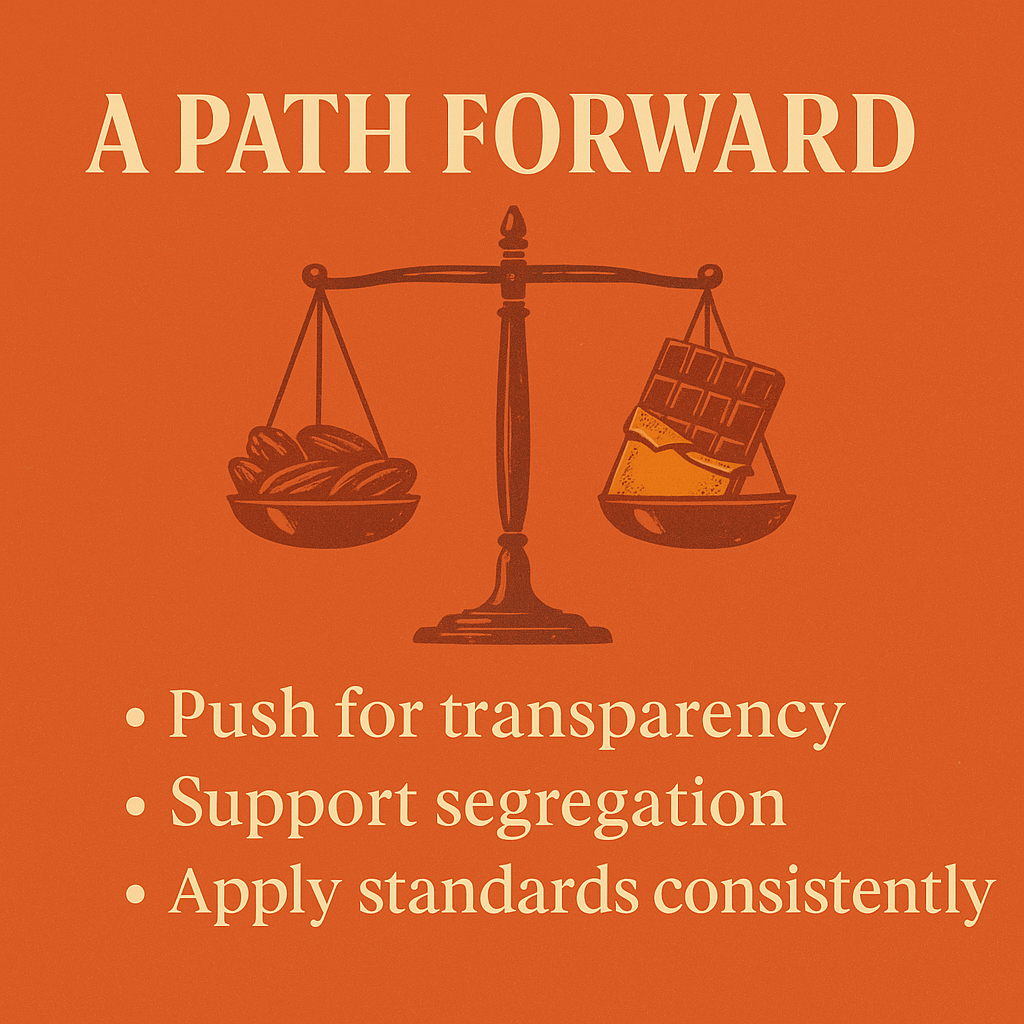Before we go any further, a little transparency.
For over eight years I worked with Divine Chocolate, one of the world’s first Fairtrade chocolate companies co-owned by cocoa farmers themselves.
That experience gave me a front-row view of what Fairtrade means in practice the good it can do, the challenges it faces, and the uncomfortable truths behind the ethics on our labels.
Today, I want to unpack one of those uncomfortable truths: how the mass balance system originally designed to make ethical sourcing easier can actually make life harder for the very farmers Fairtrade aims to protect.
What Exactly Is Mass Balance?
Balancing the Scales: How Mass Balance Undermines Fairtrade Farmers balance is a method of accounting used in the cocoa and sugar industries.
It tracks the overall volume of certified and non-certified ingredients that pass through a supply chain, ensuring the numbers add up on paper but not necessarily in the product itself.
Imagine a chocolate factory taking delivery of ten tonnes of certified cocoa beans and ten tonnes of non-certified beans.
Under mass balance rules, the company can sell twenty tonnes of chocolate labelled “contains Fairtrade cocoa,” even though the two types have been mixed.
The same applies to sugar.
This approach offers flexibility and scalability for manufacturers especially large ones that want to support Fairtrade without overhauling their entire logistics chain. But it also introduces a serious flaw: it blurs the link between the farmer who earned the premium and the product sold with that ethical label.
(Source: Fairtrade International, “Mass Balance and Traceability,” 2023.)
Certified Cocoa: The Gold Standard
By contrast, segregated certified cocoa keeps beans physically separate from non-certified ones.
This ensures traceability from farm to finished bar. Farmers receive the full Fairtrade Minimum Price plus the Fairtrade Premium money that supports schools, clinics, and local infrastructure.
It’s a system that rewards the people who meet ethical standards. But it’s more expensive and logistically complex. For many companies, mass balance becomes the compromise — a way to claim ethical support without running a fully traceable supply chain.
The Overlooked Ingredient: Sugar
Most people associate Fairtrade with cocoa, but in a typical milk chocolate bar, sugar is the dominant ingredient by weight often 40–50%.
That makes it even more troubling that mass balance is widely applied to sugar.
Mass balance sugar means that the company buys a set amount of certified sugar each year but may not use it directly in every product.
So, when you read “Fairtrade sugar” on a wrapper, it might not be the sugar in that bar. The claim is correct on balance sheets, but misleading in spirit.
(Source: TriplePundit, “Mass Balance: Pushing Your Chocolate Bar Too Far?”, 2015.)
Tony’s Chocolonely: A Case Study in Contradiction
Let’s take Tony’s Chocolonely, a company I respect for its campaigning work on slavery and transparency in cocoa.
Tony’s has publicly rejected mass balance sourcing for cocoa, proudly claiming that all its beans are fully traceable from farm to bar.
But look closely at the small print on the packaging:
“Fairtrade cocoa and sugar. Sugar with mass balance.”
(Source: Tony’s Chocolonely U.S. website and product packaging, 2025.)
In other words, while Tony’s cocoa is traceable, its sugar is not. The company pays into the Fairtrade system through mass balance credits, but the sugar in any given bar may come from a non-certified source.
That inconsistency hasn’t gone unnoticed.
Chocolate industry analyst Clay Gordon wrote that Tony’s “distances itself from mass balance on cocoa while relying on it for sugar,” arguing that it creates “a tension between ethical marketing and operational reality.”
(Source: TheChocolateLife.com, “Four Bars Too Far,” 2023.)
Tony’s deserves credit for transparency they do disclose this clearly but many consumers never notice.
For a brand built on moral clarity, the distinction between certified cocoa and mass balance sugar is a fine line that risks eroding trust.
Who Loses Out?
For farmers, the consequences are real.
When certified ingredients are mixed into mass balance systems, the premiums intended for certified producers can be spread too thin.
A 2022 Wageningen University study found that smallholder incomes under mass balance certification often showed no measurable improvement over non-certified counterparts mainly due to premium dilution and weak traceability.
The result? Fewer incentives for farmers to invest in sustainable practices, and a slower shift toward living incomes.
(Source: Wageningen University & Research, “The Effectiveness of Certification in Cocoa,” 2022.
Transparency Is the True Premium
Consumers buy Fairtrade chocolate because they want to make a difference. They’re not naïve they know no system is perfect but they expect honesty.
When mass balance is used without clear explanation, it undermines that trust. It turns Fairtrade from a guarantee into a gesture.
And gestures don’t build schools or fund replanting programmes premiums do.
A Path Forward
Mass balance isn’t inherently bad. It was created as a bridge a way to let big supply chains support sustainability before they were ready for full segregation. But it’s time to refine it.
Here’s how the industry can do better:
Be upfront. Clearly label when ingredients are mass balance sourced. Consumers can handle nuance it’s secrecy that breaks trust.
Support segregation where possible. Especially for smaller craft makers who already work with direct-trade or single-origin cocoa.
Apply standards consistently. If a company rejects mass balance for cocoa, that principle should extend to sugar, vanilla, and any other Fairtrade ingredient.
Reward real impact. Ensure farmers see tangible benefits from certification not theoretical ones buried in spreadsheets.
Rebalancing the Promise
Mass balance was meant to spread good. In practice, it can spread confusion.
If Fairtrade is to remain credible, the connection between the farmer’s work and the consumer’s purchase must be visible, measurable, and fair.
As someone who’s stood on both sides of this system in cocoa-growing villages and corporate boardrooms I still believe in Fairtrade’s mission.
But belief isn’t blind faith. It’s the determination to keep asking hard questions until the scales are truly balanced.
#Fairtrade #MassBalance #EthicalChocolate #Transparency #Sustainability #CocoaFarmers #DivineChocolate #TonysChocolonely #ExportChampions #SoldtotheWorld
